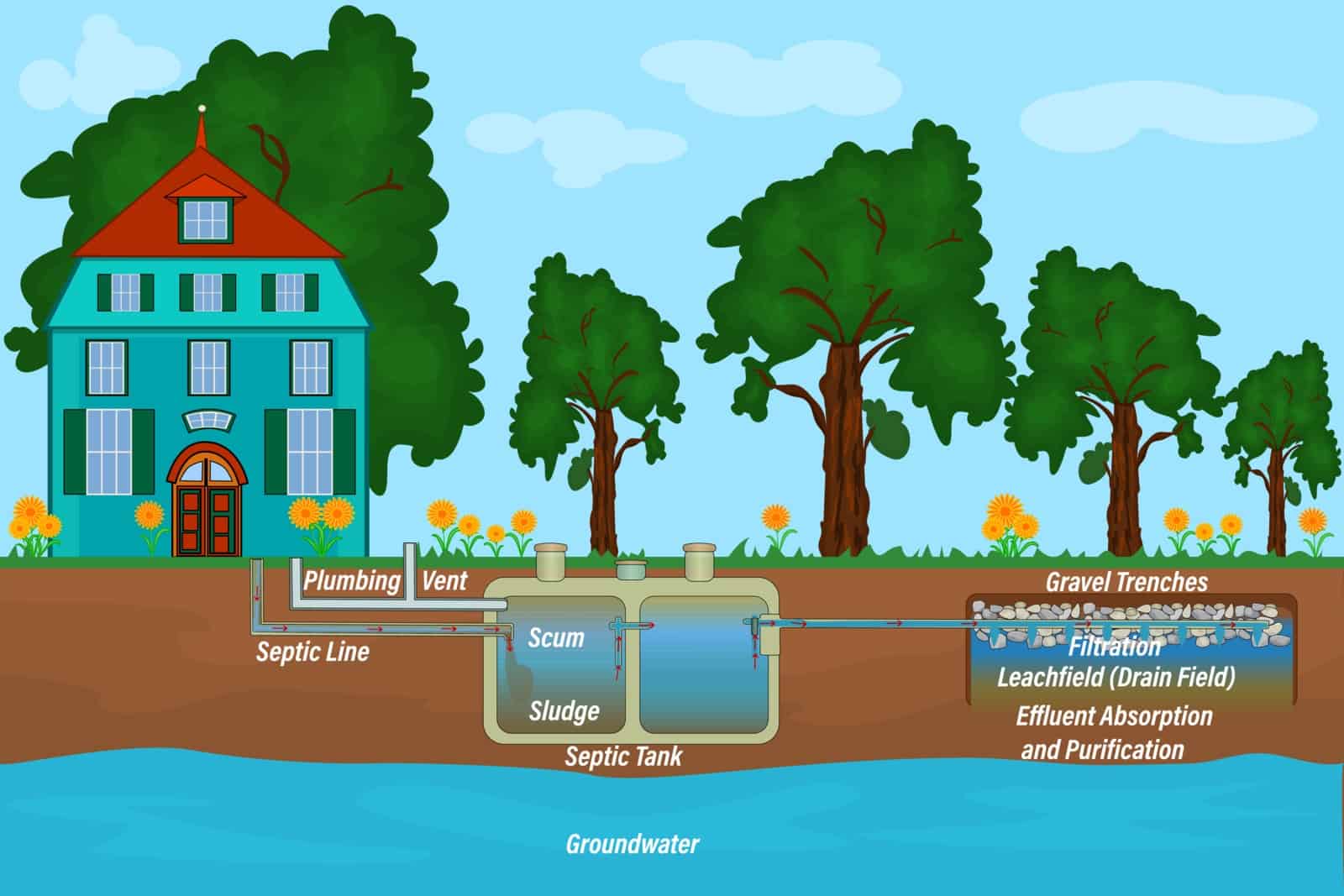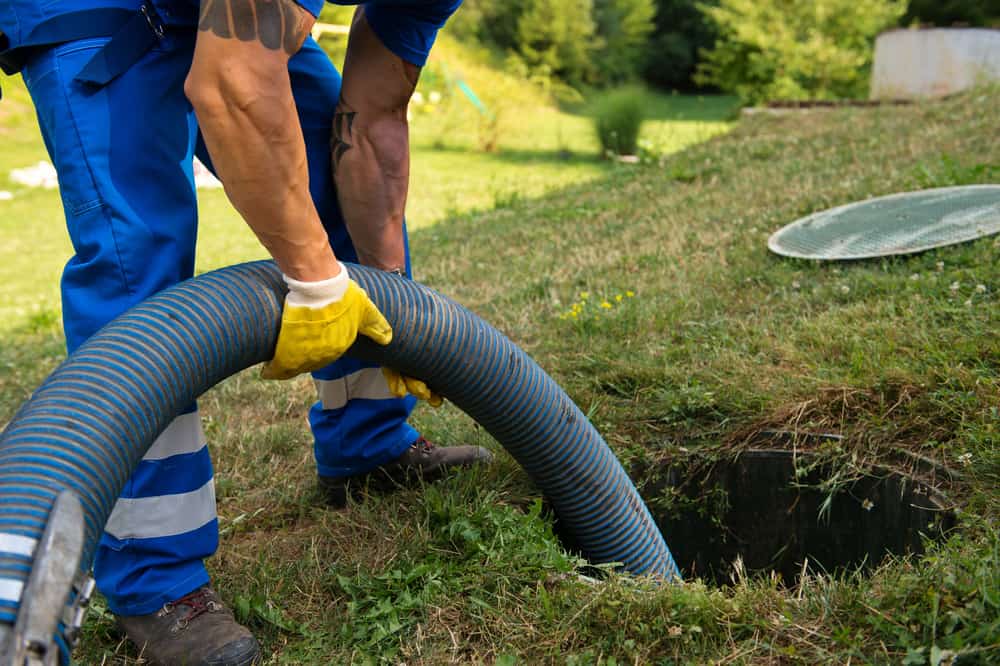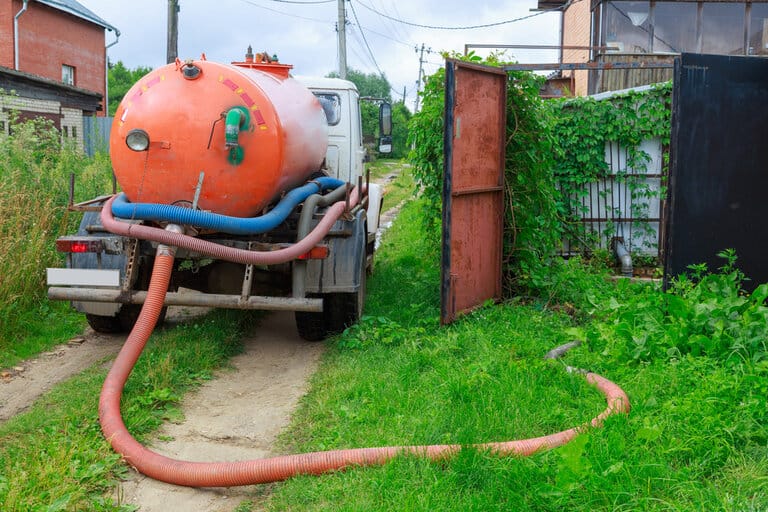If you are moving to the country, chances are that you will have to deal with owning a septic system. This means that you will also have to manage septic tank maintenance. Those who have always had homes connected to a sewer system might find this intimidating.
Having lived in cities and suburbs for 40+ years, I never had to concern myself with where the waste went. When I moved to an unincorporated area, I learned quickly. Especially when my next-door neighbor’s sewage started backing up in their showers and bathtub!
Generally, most people want to flush and forget about it. Yet, when you live the independent, homestead lifestyle, this is something that you have to consider. Routine maintenance is key. When you move into a home, you should also have it maintained. Keep reading to learn about septic tank maintenance, septic tank maintenance costs, and how to care for your septic system.
Septic Tank Maintenance
More than 60 million people in the United States have septic systems. This translates to about 1 in 5 households depending on a septic system for the management of their household waste. While you may be unfamiliar with this method of waste management, it is common and completely safe. While a broken or poorly maintained system can be a problem, a well-maintained one is headache-free.
Like many other things about the homestead life, you can you can learn about septic systems. When you understand how they work, septic tank maintenance will make sense. You can manage this essential part of country living. There is no need to worry because the basics of it are fairly straightforward.
How a Septic System Works
Septic systems have two main parts.
- Septic tank
- Field lines, leach field, or leach lines
The septic tank is a large concrete or plastic tank that goes into the ground. The field lines, also called the leach field or the leach lines, are long perforated pipes. These pipes are buried 18 to 24 inches in the ground. They are also connected to the septic tank.
Waste from the house flows into the septic tank through a pipe. In the tank, the waste separates into three distinct layers.
- The solid waste sinks to the bottom of the tank.
- Lighter solids form a scum layer consisting of fats and greases that float on the top of the liquid, called effluent.
- The liquid flows out of the tank to the field lines.
The effluent still has harmful bacteria in it when it gets to the field lines. The effluent seeps down through the layers of rock and dirt to the groundwater. By the time the liquid reaches the groundwater, the layers of sand and dirt have purified it. All that remains is clean, pure water.
But, what about the solids in the tank?
When the solids sink to the bottom of the tank, microscopic bacteria go to work. These bacteria digest the solids. They are a self-sustaining colony, and they reproduce in the tank. They consume the waste, greatly reducing its volume.
Eventually though, the solids build up enough so that the tank will need to be emptied. This is when you will call your septic tank company, and they will either pump the tank or clean the septic tank. This does not happen often.
You will only need to schedule for septic tank pumping or septic tank cleaning every few years.
Basic Operation
This is the way a basic septic system operates. There are a few variations on it, but overall, most tanks include these three things:
- Tank
- Field lines
- Colony of bacteria
Some systems require electric pumps or have filters and screens. You can ask your septic tank maintenance company about these extras.

What Can Go Wrong With a Septic Tank?
While a septic system is fairly straightforward, there are a few things that can go wrong with it. Of course, these things do not necessarily happen to everyone with a septic system. However, they are possibilities. Yet, just by maintaining the septic system, you can most likely avoid these problems.
Sewage backing up
If the septic tank has not been pumped out in a long time, the sewage may back up into the house. This happens when the sludge builds up in the tank. The first indication that a problem is brewing is a slight odor of sewage in your home or in your yard. Eventually, sewage may start backing up into the drains in the house. Even your shower, sink, or washing machine could end up with sewage in the drain.
Clogged field lines and overflowing solids into field lines
Even if you don’t end up with sewage in your house, you may have problems. The septic tank can overflow solids into your field lines. This is just as bad as having sewage in the house, even if the affects are invisible. Clogged field lines can’t be cleaned. The only solution to this problem is to dig the lines up and replace them. This is a very expensive repair.
Damage to field lines
Another thing that can go wrong with a septic system is that the field lines can become damaged. The field lines are not usually buried very deep in the soil. If someone drives a heavy vehicle through the yard, the field lines can be crushed. When this happens, the lines will not drain as well as they should, and they will have to be dug up and replaced.
Field lines can also have problems when tree roots begin to invade the porous pipes. For a leach field to work correctly, the lines have to have plenty of places for the water to seep out. If you have trees planted near your leach field, the roots may be causing problems in your septic system.
However, if you learn about septic tank care and follow the dos and don’ts of septic tank maintenance which I list below, you won’t have anything to worry about.
Hints of Septic System Problems
A septic system does not just suddenly start giving you problems. Usually, there are hints that an issue is brewing. If you pay attention to what is happening in your home and yard, you will know that something needs to be addressed. If you are proactive, you can head off a potential issue before you have nasty sewage in the wrong place.
First, if you have sewage backing up in your drains, this is an emergency. Stop running water in the house at all and don’t flush a toilet. Call the septic pumping company ASAP!
Second, a properly working septic system will not release any odors. If you start smelling sewage in your home, it’s time to make a phone call to the septic maintenance company. This probably means that your septic system is getting full. You should not smell sewage in the home or in your yard.
Third, do you have spots in your yard that are consistently wet and boggy? Especially if these spots smell bad, you probably want to call the septic maintenance company. A properly draining septic drain field will not be wet or leave puddles the yard.

Fourth, is the grass on the field lines growing much faster than the rest of the yard? Especially if the ground is very soft and soggy in these areas, you may want to check your septic system.
Septic Tank Maintenance Costs
Since you are no longer paying for the city to process your sewage, you may think that you are off the hook for costs associated with that. That is partially correct. It is true that you no longer have a monthly fee that pays for this. However, you will have some expenses associated with maintaining your septic system.
Every three to five years, you will need to call the septic company. They will come out and inspect your system. They can see if your tank needs pumping or cleaning.
Pumping a septic tank just empties the tank of effluent and some sludge. Septic system cleaning is more extensive. It is also more expensive.
Septic Tank Service
Cleaning a septic tank involves breaking up any compacted sludge. Some companies use a high pressure water jet to break up sludge in the tank. Sometimes if roots have invaded the tank, they will need to be removed with special equipment.
Everything will be pumped out and nothing will be left in the tank. This process of cleaning may be more expensive than simply pumping it. It will take more time and more extensive equipment than just pumping the tank.
Some septic system maintenance companies use the terms “cleaning” and “pumping” the tank interchangeably. Be sure to ask questions to avoid misunderstandings.
Costs for septic system maintenance pumping and cleaning
To pump your septic tank and system, it typically costs between $250 to $500. This will not only pay for the technician’s time and equipment, but it also pays to dispose of the waste. If your tank is larger, the pumping will be more costly since the charge is often per gallon of waste.
If your tank needs cleaning, that will be an additional 300 to 500 dollars.

How Often to Schedule Septic Tank Maintenance
How often your tank will need attention depends on a variety of factors. If you have a larger family, your tank will need to be pumped more often. If you have a smaller tank, you will need to schedule this more frequently.
However, if you have a small family and a large tank, you may go more than 5 years between pumping. After the first two or three visits, the technician will be able to help you determine what the best pumping interval is for your situation.
The cost for installing a new septic system is between 3000 and 5000 dollars. While paying a company to come out and pump or clean your system may seem expensive, when you compare it to the cost of a whole new system, it really is a bargain.
If you spend a little every few years, your septic system can last for decades. Put the money that you would have spent monthly on sewage in the bank. Then, when it is time to have your septic tank maintained, you will have the cash on hand.
Moving to a Home with a Septic System
If you are moving into a home with an existing septic system, you probably should schedule a visit with the septic company. They can inspect your system and tell you if there are any problems. They may go ahead and pump it. This will give you a starting point for your “every 3 to 5 years” when you will need to pump the system.
If you are new to an area, you may not know who to call to help you maintain your septic system. If you are on good terms with your neighbors, ask them who they use for their maintenance.
If you still are unsure, contact your local county extension office. They will probably have some helpful suggestions. Another alternative is to contact the health department for your county. Often, the health department manages problems with septic tanks, so they should know who the best in the area will be to handle this task.
Some manufacturers recommend a monthly septic tank treatment that is flushed down the toilet. If you have recently pumped or cleaned your septic tank, you may want to add a bit of one of these products to initially establish the bacterial colony.
However, once the colony is established, these products are unnecessary. If you are properly maintaining the system, the bacteria will be self-sustaining. Only add things to your septic system that your maintenance company recommends.
How to Care for Your Septic System
How to care for your septic system? To keep your septic system running smoothly, there are several things you can do. Also note what you shouldn’t do when you have a septic system.
How to care for your septic system – Do:
- Remember to schedule septic tank pumping or septic tank cleaning every 3 – 5 years.
- Inspect your septic tank once or twice a year to make sure that it is working properly. If you are not sure what to look for, ask the person who comes out to pump your tank what a properly functioning septic tank should look like.
- Keep the lid of the septic tank in place. If the lid isn’t in place, it could be a safety hazard, and people or pets could fall in it and become injured. Examine the lid periodically to check for cracks or weathering. Replace the lid if it starts looking old, cracked or worn.
- Keep the cover for your septic tank accessible. Don’t cover it with dirt or plant shrubs and plants around it that might make it difficult to remove or find.
- Be sure to keep gutters from draining toward your field lines and your septic tank. Rain water can infiltrate your septic system, and too much water can cause problems in your septic tank.
- Find a way to drain your swimming pool water or hot tub water far from your septic system.
- Conserve water. Not only is this good for the earth and your pocketbook, it is good for your septic system. Too much water in the tank can make it fill too quickly, needing excess pumping. Install low flow shower heads and toilets, and try to avoid wasting water.
- Be mindful of running too many water sources at once. Run the dishwasher and washing machine at different times and when no one is showering.
- Purchase dishwashers, washing machines, and other appliances that conserve water. Teach your kids the benefits of saving water.
How to care for your septic system – Don’t:
- Don’t flush anything but human waste and toilet paper down the toilet. Tampons, sanitary napkins, and paper towels may not break down very well, if at all in your septic tank. That is, if they make it to the tank at all.
Sometimes these things hang up on the way to the septic tank and can cause backups in your house. Do yourself a favor and put a lined trash can next to every toilet in the house where family member can dispose of these items in the household trash.
- Don’t flush wipes of any kind down the toilet. Even the wipes that are labeled as “flushable” will not break down in the septic tank.
These kinds of things will cause your septic tank to need pumping sooner, so never flush them down the toilet. Throw them away with your household trash.
- Don’t plant trees or bushes near your field lines. Their roots may invade your leach field and cause them to clog. Remember that the key to a functioning septic system is to have the field lines draining well so avoid having trees near them.
- Don’t dig near your field lines. You may end up digging through them and causing expensive damage to your septic system.
- Be sure to not install structures like sheds, garages or outbuildings near your field lines or septic tank.
- Don’t drive over your septic tank or field lines. They are only several inches in the ground and the weight of a vehicle can cause them to collapse.
- Don’t excessively use your garbage disposal.
Most food scraps should be scraped into the trash because excess food items in the septic tank may not break down very well. Try to avoid letting coffee grounds go down the drain. In addition, grease, fats, and oils are hard on the bacteria in the tank. Plus, grease can cause clogs in your drains. Save glass jars, aluminum cans or plastic containers (save them from jelly, pickles, olives, etc.) and use them to collect the grease.
- Don’t use harsh cleaners in your home. Things like bleach can kill the bacteria that make the septic system work and cause problems for your system.
An occasional cup of bleach in a load of whites may not be too bad for the system, but it shouldn’t be a regular thing. Find other ways of whitening your clothing and killing bacteria. Use natural cleaners like vinegar, salt, and baking soda when cleaning your home.
- Don’t use harsh chemical treatments for clogs in the drain. These can kill the bacteria in the tank. Use mechanical means to remove clogs, like a drain snake or a plunger. For greasy clogs, pour boiling, soapy water down the drain to melt the grease and dissolve it.
- Don’t wash household chemicals down the drain. Things like paint or solvents are bad for your septic tank bacteria as well.
Additionally, these chemicals can be pushed out into the leach field and contaminate the groundwater. Dispose of things like paint and solvents in a hazardous materials dumpster.
- Don’t drain your swimming pool or hot tub into the field lines or around the septic tank. This water can infiltrate your system and cause it to fill up more quickly. Additionally, saturated leach fields will not drain very well and could cause a back-up in your home.
Septic System Maintenance
While it sounds strange to have your waste in a container below ground, septic systems actually aren’t that complicated. In fact, they use technologies that municipal sewage systems use, albeit on a smaller scale.
If you learn the basics of septic system maintenance, you don’t have to worry about problems. Schedule pumping or cleaning every 3 – 5 years. It’s worth it for the problems you’ll avoid. Rural Living Today Resources

